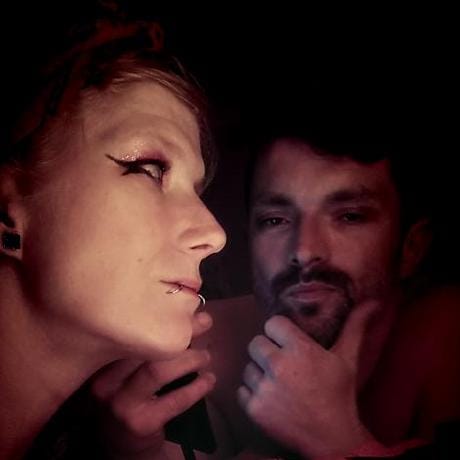Search
Code3,282
* Users input their birth details, a sign to focus on, and a life domain. * The backend then uses the "Astrologer Prompt" (a detailed system prompt) * to query an OpenAI model, which generates a comprehensive astrological report. * * Core Logic: * 2. Backend (Deno Val Function): * - Receives these inputs. * - Constructs a user message for the OpenAI API. This message includes * the raw birth details, focus sign, domain, etc. * - Uses the **ENTIRE** "Astrologer Prompt" (with {{sign}} and {{domain}} * placeholders filled) as the system prompt for an OpenAI API call. * - Calls a powerful OpenAI model (e.g., gpt-4o). * - Receives the structured JSON astrological report from OpenAI. * - Sends this report back to the client for display. * * May 28, 2025. The LLM primed by it is assumed to have access to or * knowledge of transit data for this date. * - OpenAI API Key: An `OPENAI_API_KEY` environment variable must be available * in the Val Town environment for `std/openai` to work. * * Inspired by the structure of the "Goal-Oriented Multi-Agent Stock Analysis Val".// --- Imports ---import { OpenAI } from "https://esm.town/v/std/openai";// NOTE: Deno.env is used directly for environment variables.}// --- THE ASTROLOGER PROMPT (System Prompt for OpenAI) ---// This will be used by the backend to instruct the AI.// Placeholders {{sign}} and {{domain}} will be replaced dynamically.}// --- Helper Function: Call OpenAI API (Adapted - Robust error handling retained) ---async function callOpenAI( systemPrompt: string, userMessage: string, // Simple hash for prompt might not be as useful if {{placeholders}} change content significantly. // Consider logging snippet of system prompt if needed for debugging. const logPrefix = `OpenAI Call [${callId}] (${model}, JSON: ${isJsonOutputRequired})`; log( `[INFO] ${logPrefix}: Initiating... System prompt (template used). User message snippet: ${ try { const openai = new OpenAI(); // API Key from environment const response = await openai.chat.completions.create({ model: model, messages: [{ role: "system", content: systemPrompt }, { role: "user", content: userMessage }], const content = response.choices?.[0]?.message?.content; if (!content) { log(`[ERROR] ${logPrefix}: OpenAI API returned unexpected or empty response structure.`); throw new Error("Received invalid or empty response content from AI model."); } log(`[SUCCESS] ${logPrefix}: OpenAI call successful.`); return { role: "assistant", content: content }; } catch (error) { if (errorResponseData?.message) { errorMessage = `OpenAI Error (${statusCode || "unknown status"}): ${errorResponseData.message}`; } else if (errorResponseData?.error?.message) { errorMessage = `OpenAI Error (${statusCode || "unknown status"}): ${errorResponseData.error.message}`; } // ... (retain other specific error message constructions from original Val) .replace(new RegExp("{{domain}}", "g"), inputs.focusDomain); // 2. Construct the User Message for the OpenAI API call // The Astrologer Prompt expects `birth_chart_data`. We will pass raw birth details // and let the LLM (primed with Astrologer Prompt) handle interpretation. ); // 3. Call OpenAI log("[STEP] Calling OpenAI with Astrologer Prompt..."); // Using gpt-4o as it's capable and the astrological prompt is complex. // The ASTROLOGER_SYSTEM_PROMPT_TEMPLATE implies the model should generate JSON. const aiResponse = await callOpenAI(populatedSystemPrompt, userMessageJson, "gpt-4o", true, log); // 4. Parse and Return Result // (e.g., if the AI itself couldn't perform the analysis and returned an error structure as per its instructions) // The ASTROLOGER_SYSTEM_PROMPT_TEMPLATE does not explicitly define an error structure from the AI side, // but callOpenAI returns its own {"error": "..."} if the call itself failed. if (parsedAiResponse.error && aiResponse.role === "system") { // Error from callOpenAI wrapper log(`[ERROR] OpenAI call wrapper reported an error: ${parsedAiResponse.error}`); return { error: "Failed to get report from Astrologer AI.", details: parsedAiResponse.error }; }Note: When changing a SQLite table's schema, change the table's name (e.g., add _2 or _3) to create a fresh table.### OpenAI```tsimport { OpenAI } from "https://esm.town/v/std/openai";const openai = new OpenAI();const completion = await openai.chat.completions.create({ messages: [ { role: "user", content: "Say hello in a creative way" },import { OpenAI } from "https://esm.town/v/std/openai";import type { LLMRequest, LLMResponse, SystemDesignRequest, SOARESystem, SystemComponent } from "../../../shared/types/core.ts";export class SOAREBrain { private openai: OpenAI; constructor() { this.openai = new OpenAI(); } async reason(request: LLMRequest): Promise<LLMResponse> { try { const completion = await this.openai.chat.completions.create({ model: "gpt-4o", messages: [import { OpenAI } from "https://esm.town/v/std/openai";import * as cheerio from "https://esm.sh/cheerio@1.0.0-rc.12";import { EarningOpportunity, WebPageContent, AnalysisResult } from "../shared/types.ts";const openai = new OpenAI();export async function analyzeWebPage(url: string, focus?: string): Promise<AnalysisResult> { try { const completion = await openai.chat.completions.create({ model: "gpt-4o-mini", messages: [ * Uses 'npm:pdf.js-extract' for PDF extraction. * Serves HTML UI & API endpoint from the same Val. * Assumes 'openai' secret is set in Val Town environment variables. * * Last Updated: {{current_date}} (Templated Version) * max_pdf_size_mb: {{max_pdf_size_mb}}, // e.g., 10 * text_truncation_length: {{text_truncation_length}}, // e.g., 25000 * openai_model_name: "{{openai_model_name}}", // e.g., "gpt-4o" * contact_form_placeholders_en: { name: "Your Name", email: "Your Email", message: "Message" }, * contact_form_placeholders_es: { name: "Tu Nombre", email: "Tu Correo", message: "Mensaje" },export default async function(req: Request) { // --- Dynamic Imports (Unchanged) --- const { OpenAI } = await import("https://esm.town/v/std/openai"); // const { z } = await import("npm:zod"); // Zod might be optional if config is trusted const { fetch } = await import("https://esm.town/v/std/fetch"); // --- CONFIGURATION (These would be replaced by the template variables at generation time) --- const APP_CONFIG = `\{{\app_config_json}}`; // e.g., { openai_model_name: "gpt-4o", text_truncation_length: 25000, ... } const ANALYSIS_AGENTS = `\{\{analysis_agents_json}}`; // Array of agent objects async function extractPdfTextNative(data: ArrayBuffer, fileName: string, log: LogEntry[]): Promise<string | null> { /* ... original ... */ } // --- Helper Function: Call OpenAI API (Uses APP_CONFIG for model) --- async function callOpenAI( openai: OpenAI, systemPrompt: string, userMessage: string, modelFromConfig = APP_CONFIG.openai_model_name || "gpt-4o", // Use configured model expectJson = false, ): Promise<{ role: "assistant" | "system"; content: string | object }> { /* ... original logic, but use modelFromConfig ... */ const model = modelFromConfig; // ... rest of the original callOpenAI function try { const response = await openai.chat.completions.create({ model, messages: [{ role: "system", content: systemPrompt }, { role: "user", content: userMessage }], log: LogEntry[], ): Promise<LogEntry[]> { const openai = new OpenAI(); log.push({ agent: "System", type: "step", message: "Workflow started." }); // ... initial logging of input type ... // If chaining is needed, {{previous_output}} could be another placeholder in prompts. const agentResult = await callOpenAI( openai, agentSystemPrompt, // The agent's specific prompt truncText, // User message is the doc text itself, or could be empty if prompt is self-contained APP_CONFIG.openai_model_name, agentConfig.expects_json ); * 1. Define Application Configuration: * Fill in the \`{{app_config_json}}\` placeholder with general settings for your app * (e.g., OpenAI model, max file size, default language). * * 2. Define Analysis Agents: * - `agent_id`: A unique machine-readable ID. * - `agent_name_en`/`agent_name_es`: Human-readable names for UI and logs. * - `system_prompt`: The OpenAI prompt for this agent. Can use `{{document_text}}`. * - `expects_json`: Boolean, if the prompt asks OpenAI for JSON output. * - `ui_display_info`: How to render this agent's results: * - `card_title_en`/`card_title_es`: Title for the results card. * and `{{app_config.document_format_accepted_label}}` (e.g. "PDF") for UI text. * * 5. OpenAI API Key: * Ensure your environment (e.g., Val Town secrets) has the `OPENAI_API_KEY` (or the appropriate * environment variable name for the `OpenAI` library) set. * * 6. Deployment:### Tech Stack- **Backend**: Hono.js for API routing- **AI**: OpenAI GPT-4o-mini for content analysis- **Web Scraping**: Cheerio for HTML parsing- **Frontend**: Vanilla JavaScript with TailwindCSS## 🔧 Environment SetupThe analyzer uses OpenAI's API which is automatically configured in Val Town. No additional setup required!## 📊 What It Analyzesimport { Hono } from "https://esm.sh/hono@3.11.7";import { OpenAI } from "https://esm.town/v/std/openai";import { readFile } from "https://esm.town/v/std/utils/index.ts";import { analyzeWebPage } from "./analyzer.ts"; } if (error.message.includes("OpenAI") || error.message.includes("API key")) { return c.json({ error: "AI analysis service requires API key configuration. Please contact the administrator." }, 503); }// SERVER-SIDE LOGIC (TypeScript)// =============================================================================import { OpenAI } from "https://esm.town/v/std/openai";// --- Configuration --- maskSrc?: string;}interface OpenAIResponse { races: RaceInfo[];}];// --- OpenAI Generation Function ---async function generateRaceDataWithOpenAI(): Promise<RaceInfo[]> { const openai = new OpenAI(); const numToRequest = Math.max(1, NUM_CARDS_TO_GENERATE); const prompt =Return STRICTLY as a single JSON object: { "races": [ { race1 }, { race2 }, ... ] }. No introductory text or explanations outside the JSON structure.`; try { console.info(`Requesting ${numToRequest} race data generation from OpenAI...`); const completion = await openai.chat.completions.create({ model: "gpt-4o", messages: [{ role: "user", content: prompt }], }); const rawContent = completion.choices[0]?.message?.content; if (!rawContent) throw new Error("OpenAI returned an empty response message."); let parsedJson; parsedJson = JSON.parse(rawContent); } catch (parseError) { console.error("Failed to parse OpenAI JSON response:", parseError); console.error("Raw OpenAI response:", rawContent); throw new Error(`JSON Parsing Error: ${parseError.message}`); } ) { console.warn( `OpenAI response JSON failed validation for ${numToRequest} races:`, JSON.stringify(parsedJson, null, 2), ); throw new Error( "OpenAI response JSON structure, count, data types, color format, hint value, or mask URL invalid.", ); } const generatedData = (parsedJson as OpenAIResponse).races.map(race => ({ ...race, borderAnimationHint: race.borderAnimationHint || "none", })); console.info(`Successfully generated and validated ${generatedData.length} races from OpenAI.`); return generatedData; } catch (error) { console.error("Error fetching or processing data from OpenAI:", error); console.warn("Using fallback race data due to the error."); return fallbackRaceData.slice(0, numToRequest).map(race => ({// --- Main HTTP Handler (Val Town Entry Point) ---export default async function server(request: Request): Promise<Response> { const activeRaceData = await generateRaceDataWithOpenAI(); const css = `import { OpenAI } from "https://esm.town/v/std/openai";import { type Context, Hono } from "npm:hono";import { paymentMiddleware } from "npm:x402-hono";const openai = new OpenAI();const app = new Hono();app.get("/jokes", async (c: Context) => { const completion = await openai.chat.completions.create({ messages: [ { role: "user", content: "Tell a punny programming joke" },Note: When changing a SQLite table's schema, change the table's name (e.g., add _2 or _3) to create a fresh table.### OpenAI```tsimport { OpenAI } from "https://esm.town/v/std/openai";const openai = new OpenAI();const completion = await openai.chat.completions.create({ messages: [ { role: "user", content: "Say hello in a creative way" },
reconsumeralization
import { OpenAI } from "https://esm.town/v/std/openai";
import { sqlite } from "https://esm.town/v/stevekrouse/sqlite";
/**
* Practical Implementation of Collective Content Intelligence
* Bridging advanced AI with collaborative content creation
*/
exp

kwhinnery_openai

lost1991
import { OpenAI } from "https://esm.town/v/std/openai";
export default async function(req: Request): Promise<Response> {
if (req.method === "OPTIONS") {
return new Response(null, {
headers: {
"Access-Control-Allow-Origin": "*",
No docs found